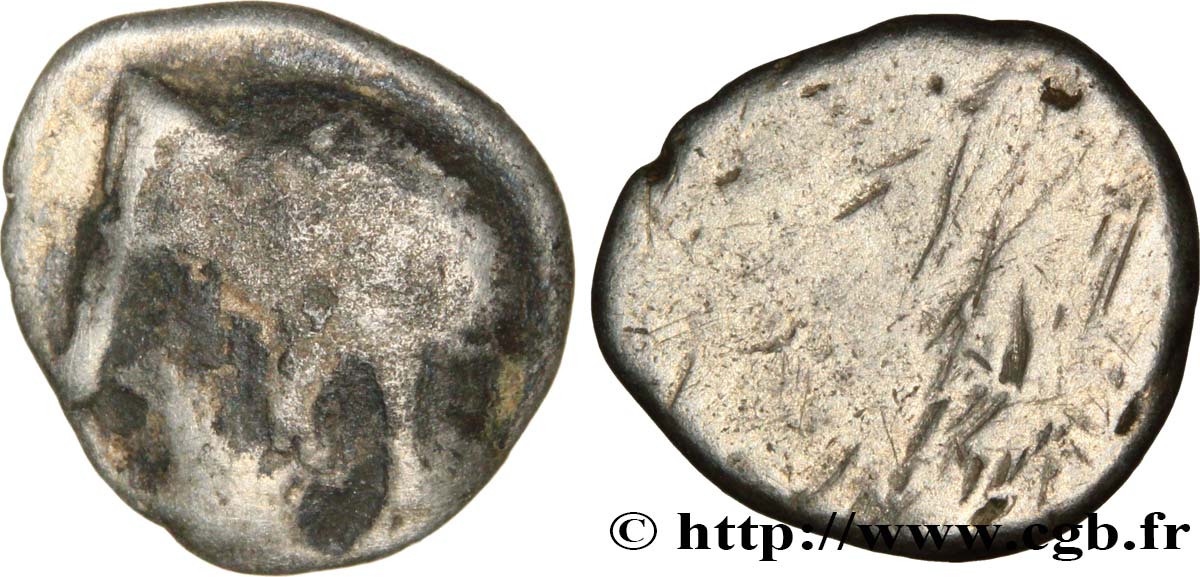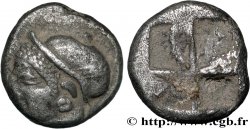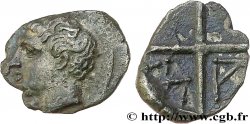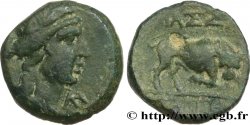E-auction 59-26937 - bga_260450 - MASSALIA - MARSEILLE Litra du type du trésor d'Auriol à la tête d'Artémis, revers lisse
You must signin and be an approved bidder to bid, LOGIN TO BID. Accounts are subject to approval and the approval process takes place within 48 hours. Do not wait until the day a sale closes to register. Clicking on « bid » constitutes acceptance of the terms of use of cgb.fr private e-auctions.
Bids must be placed in whole Euro amounts only. The sale will start closing at the time stated on the item description; any bids received at the site after the closing time will not be executed. Transmission times may vary and bids could be rejected if you wait until the last second. For further information ckeck the E-auctions F.A.Q.
NO BUYER'S FEE.
NO BUYER'S FEE.
| Estimate : | 190 € |
| Price : | 68 € |
| Maximum bid : | 74 € |
| End of the sale : | 02 June 2014 15:16:30 |
| bidders : | 7 bidders |
Type : Litra du type du trésor d'Auriol à la tête d'Artémis, revers lisse
Date: c. 470-450 AC.
Mint name / Town : Marseille (13)
Metal : silver
Diameter : 9 mm
Weight : 0,77 g.
Rarity : R3
Coments on the condition:
Flan un peu court avec un avers assez bien centré mais un peu mou, et un revers complètement lisse. Très légère patine, plus sombre au revers
Catalogue references :
Obverse
Obverse legend : ANÉPIGRAPHE.
Obverse description : Tête d'Artémis à gauche, la coiffure en pointillés relevés sur la nuque.
Reverse
Reverse legend : ANÉPIGRAPHE.
Reverse description : Lisse sans carré creux.
Commentary
Cette monnaie est très inhabituelle avec un revers lisse sans aucun carré creux.
Cette particularité n’est pas sans rappeler la monnaie n° 6 publié dans le CN 183 de mars 2010. Le type de droit associé à ce revers est différent, dans le cadre d’une étude sur la série à la tête d’Apollon au crobylos à droite... Mais le revers lisse sans carré creux est assez inhabituel pour pouvoir être mis en relation !
Ce rare type appartiendrait plutôt à la Provence au sens large. L'exemplaire n° 9 de l'Annexe 2 de Furtwängler (= BN 504) pèse 0,89 gramme et ceux du trésor de la RN 1983 ont un poids moyen de 0,91 gramme.
This coin is very unusual with a smooth reverse without any hollow square. This particularity is reminiscent of coin no. 6 published in CN 183 of March 2010. The type of obverse associated with this reverse is different, in the context of a study on the series with the head of Apollo with a crobylos to the right... But the smooth reverse without a hollow square is unusual enough to be able to be linked! This rare type would rather belong to Provence in the broad sense. Copy no. 9 of Furtwängler's Appendix 2 (= BN 504) weighs 0.89 grams and those of the RN 1983 treasure have an average weight of 0.91 grams
Cette particularité n’est pas sans rappeler la monnaie n° 6 publié dans le CN 183 de mars 2010. Le type de droit associé à ce revers est différent, dans le cadre d’une étude sur la série à la tête d’Apollon au crobylos à droite... Mais le revers lisse sans carré creux est assez inhabituel pour pouvoir être mis en relation !
Ce rare type appartiendrait plutôt à la Provence au sens large. L'exemplaire n° 9 de l'Annexe 2 de Furtwängler (= BN 504) pèse 0,89 gramme et ceux du trésor de la RN 1983 ont un poids moyen de 0,91 gramme.
This coin is very unusual with a smooth reverse without any hollow square. This particularity is reminiscent of coin no. 6 published in CN 183 of March 2010. The type of obverse associated with this reverse is different, in the context of a study on the series with the head of Apollo with a crobylos to the right... But the smooth reverse without a hollow square is unusual enough to be able to be linked! This rare type would rather belong to Provence in the broad sense. Copy no. 9 of Furtwängler's Appendix 2 (= BN 504) weighs 0.89 grams and those of the RN 1983 treasure have an average weight of 0.91 grams








 Report a mistake
Report a mistake Print the page
Print the page Share my selection
Share my selection Ask a question
Ask a question Consign / sell
Consign / sell
 Full data
Full data









